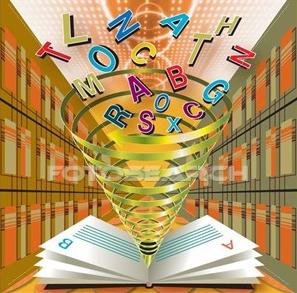Last time I talked about the vocabulary obsession and its consequences. This time, as promised, I will start sharing the “remedies” I have found through my research project. It was a school project I carried out with my partner Kim. After researching on vocabulary books in the market and surveying on the students, we attempted to provide Chinese high school students with a new approach to learning vocabulary.
Before I get to the gist of my award-winning thesis, I feel obliged to discuss some ways to destroy one’s English vocabulary learning. In this case, knowing the “don’ts” is more important than knowing the “dos.”
Are you ready? Let’s destroy! Here is everything you should NOT do:
Go and pick a catchy vocabulary book in a bookstore. It features many words that you never knew existed, but this time you must not be discouraged. In fact, you are excited to see so many challenging words.
Stop eating, for when you are learning vocabulary, words are the main course.
Make a plan larded with details. Listen patiently to those aficionados of vocabulary books, namely those teachers, and make a bold plan: try to remember at least 100 words a day.
The first day is filled with false hopes. You can easily go through 100 words, but this good feeling only lasts about five days, when you begin forgetting.
The feeling goes like this: you are sure that you have stared at this word for 5 minutes a couple of days ago, but now you can remember absolutely nothing about it.
Then you begin to get upset. Your vocabulary book includes sample sentences and even some simple English explanations, but now all you want to know is their definitions – in Chinese. Go ahead and try to remember those definitions.
After a few weeks you will be tired of just reciting the book, although you have grasped (or think you have grasped) 10% of what you tried to remember.
What’s even funnier is that you will begin mixing up what you have learned. Suddenly you cannot tell from “masticate” to “matriculate” and confuse between “condensation” and “condescension.” It surely is a funny feeling at first, but it also feels terrible: what you have spent so much time learning is now confusing you to the degree that you almost regret learning it in the first place.
So you put your “treasure book” aside and resume doing something else, like English reading, English writing, and, of course, English eating.
You will be surprised that even if you know all the words, you still cannot understand whole sentences. You will be scared of using any new words you have learned, because you know only the meaning, but not the usage. Then you will wonder while eating: what has gone wrong with my English?
(To be continued.)
上一次,我谈到了对词汇的痴迷和它的后果,这一次,正如我承诺的那样,我会与大家分享一些从我的研究项目里发现的治疗这种痴迷症的“解药”。这是一个学校的科研项目,是由我和我的伙伴金一起负责的。在研究了市场上各种各样的词汇书并且在学生中进行了科学地调查以后,我们准备提供给广大的中国高中生们一个新的学习词汇的方法。
在我要谈及这篇意义非凡的论文的精髓之前,我觉得有必要讨论一些能够彻底摧毁一个人英语词汇学习错误理念的方法。因为知道不该做什么有时比知道该做什么更重要。
准备好了吗?让我们开始我们的破坏之旅吧!下面的这些就是你不应该做的一切:
去书店买一本容易让人误入歧途的词汇书。这本书的特色就是有很多单词是你以前闻所未闻见所未见的,但是这并不会打消你的积极性,反而你会因为这些具有挑战性的单词而变得很兴奋。
在词汇学习的大餐中,都不要吃别的东西了,单词就是你的主菜。
制定一份详细的计划,耐心地听从词汇书里的各种教条,也就是那些所谓的名师指导,一天至少背100个单词。
第一天,在充满了谬误的幻想中你轻松地完成100个单词,但是这种良好的感觉只能持续五天左右,因为五天之后你就开始遗忘这100个单词了。
接下来的这种感觉是这样的:你确信你前两天曾盯着这个单词看了五分钟左右,但是你现在一点儿也记不起来了。然后你开始变得烦躁,你的词汇书里包含有例句甚至还会有一些简单的英文注解,但是现在你唯一想知道的就是他们的中文释义。于是去尝试着把这些定义和释义记下来。
几周以后你就会厌烦这样无聊地背书了,尽管你只掌握了或者说你自认为掌握了你曾经背过的那么多单词的百分之十。
更可笑的事情是你会开始混淆你学过的单词。突然你会无法区分“masticate” (咀嚼,粉碎)和 “matriculate”(录取)这两个单词谁是谁,然后把”Condensation”(冷凝)和“Condescension”(屈尊,俯就)混为一谈。起初你肯定觉得这种事情特别好笑,但是一想到曾经花了那么多的时间来背这些单词,而现在这些单词把你弄的无比的困惑和混乱,以至于你开始后悔为什么要背它们呢,这时的你真的会苦笑不得,痛苦个半死。
所以你现在就应该把你的“宝书”放在一边,做一些其他的事情,比如去阅读英文读物,进行英语写作,当然还有继续你的英语学习大餐
你会感到大为吃惊,因为有的时候看到一句话,即便你知道句子里所有的单词,但是你仍然不能理解这句话的意思。你害怕使用你新学的单词,因为你只知道这个单词的意思却不知道这个单词的用法。这个时候你就会开始疑惑:究竟我的英语出了什么问题?
(未完待续)


